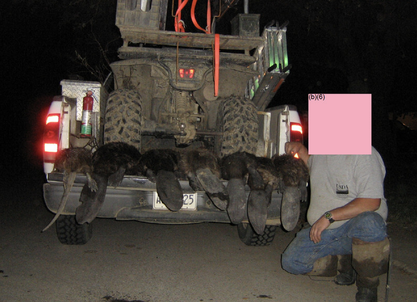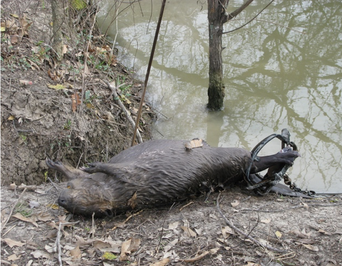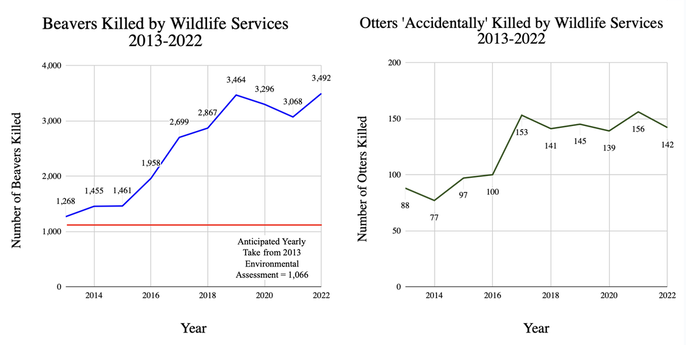Superior Bio-Conservancy Files a Lawsuit Against the United States Department of Agriculture for Killing 28,141 Beavers, 1,091 River Otters, and Destroying 14,796 Beaver Dams in 10 Years Funded by the Wisconsin Department of Natural Resources
For all media inquiries, email [email protected]
For all general inquiries, email [email protected]
The Legal Petition, Expert Opinion, and 2013 Wisconsin Beaver Environmental Assessment can all be found at the bottom of the page
For all general inquiries, email [email protected]
The Legal Petition, Expert Opinion, and 2013 Wisconsin Beaver Environmental Assessment can all be found at the bottom of the page

June 22, 2023 - The Wisconsin Department of Natural Resources (WDNR) and United States Department of Agriculture Animal and Plant Health Inspection Service (USDA-APHIS) division of Wildlife Services have destroyed wetlands, weakened flood resiliency, and hampered biodiversity in the state of Wisconsin. Spending millions of dollars of state public funds – including revenue from timber sales of Wisconsin National Forests – Wildlife Services have killed over 28,141 beavers and destroyed over 14,796 dams through hand removal or explosives since 2013 through their widespread Beaver Elimination Program. In 2022 alone, Wildlife Services hit a record high by killing 3,492 beavers, a figure more than 3 times the number it anticipated in its 2013 Environmental Assessment.
The Superior Bio-Conservancy’s efforts aimed to fundamentally reassess the damages caused by these killing practices and seek for the WDNR to consider and evaluate the ecological benefits to biodiversity, hydrology, and climate reliance that beavers provide. Under the Public Trust Doctrine, the WDNR is charged with protecting Wisconsin’s natural resources. The current Beaver Elimination Program violates that trust and is directly at odds with WDNR’s mission “to protect and enhance our natural resources: our air, land and water; our wildlife, fish and forests and the ecosystems that sustain all life.” The current Beaver Elimination Program dishonors and embarrasses the longstanding history of Wisconsin’s leadership in conservation efforts throughout the United States.
In January 2013, Wildlife Services issued an Environmental Assessment (“EA”) to examine the environmental impacts of the agency’s statewide beaver damage management activities (herein “Beaver Elimination Program”). Wildlife Services’ Beaver Elimination Program includes widespread killing of beavers through indiscriminate trapping methods that has additionally killed over 1,091 otters and thousands of other species including muskrats, turtles, herons, ducks, fish, and eagles over the past decade. WDNR also contracts with Wildlife Services to conduct beaver elimination on over 1,800 miles of coldwater streams under the guise of trout protection without any sound science to justify it. Virtually no attention has been given to non-lethal methods. Based on their analysis, Wildlife Services determined that there was no significant impact to the environment and approved continuing their current Beaver Elimination Program.
The Superior Bio-Conservancy’s efforts aimed to fundamentally reassess the damages caused by these killing practices and seek for the WDNR to consider and evaluate the ecological benefits to biodiversity, hydrology, and climate reliance that beavers provide. Under the Public Trust Doctrine, the WDNR is charged with protecting Wisconsin’s natural resources. The current Beaver Elimination Program violates that trust and is directly at odds with WDNR’s mission “to protect and enhance our natural resources: our air, land and water; our wildlife, fish and forests and the ecosystems that sustain all life.” The current Beaver Elimination Program dishonors and embarrasses the longstanding history of Wisconsin’s leadership in conservation efforts throughout the United States.
In January 2013, Wildlife Services issued an Environmental Assessment (“EA”) to examine the environmental impacts of the agency’s statewide beaver damage management activities (herein “Beaver Elimination Program”). Wildlife Services’ Beaver Elimination Program includes widespread killing of beavers through indiscriminate trapping methods that has additionally killed over 1,091 otters and thousands of other species including muskrats, turtles, herons, ducks, fish, and eagles over the past decade. WDNR also contracts with Wildlife Services to conduct beaver elimination on over 1,800 miles of coldwater streams under the guise of trout protection without any sound science to justify it. Virtually no attention has been given to non-lethal methods. Based on their analysis, Wildlife Services determined that there was no significant impact to the environment and approved continuing their current Beaver Elimination Program.

Beavers are critical to maintaining and restoring the biological integrity and hydrology of Wisconsin’s landscape. Praised as an ecosystem engineer and keystone species, new science established since the 2013 EA demonstrates that beavers restore stream structures to heal wetlands and floodplains. Wetlands are integral in supporting water quality by removing sediments, increasing species diversity and ecosystem resiliency, storing carbon, and mitigating the adverse impacts of climate change through flood reduction. According to the WDNR, 32% of the state’s listed species are wetland dependent and Wisconsin has already lost 47% of its original ten million acres of wetlands. Beaver and beaver dam elimination by Wildlife Services further devastates and destroys these precious and damaged wetlands.
Superior Bio-Conservancy is a nonprofit organization focused on restoring the biological integrity and hydrology of the Great Lakes Region and the Northern forests throughout Minnesota, Wisconsin, and Michigan. After multiple attempts to meet with and work with the WDNR and Natural Resources Board to no avail, Superior Bio-Conservancy is left with little legal recourse but to file a Petition and Notice of Intent to Sue.
On June 22, 2023, Superior Bio-Conservancy notified Wildlife Services and WDNR of its Petition and Notice of Intent to Sue in the Eastern District of Wisconsin, United States District Court against the USDA-APHIS division of Wildlife Services. The petition demands immediate updates to the 2013 Environmental Assessment for beaver management in Wisconsin under the National Environmental Protection Act (NEPA). The requested relief is to address significant new information and the current program’s potential to cause serious resource damage.
Superior Bio-Conservancy is a nonprofit organization focused on restoring the biological integrity and hydrology of the Great Lakes Region and the Northern forests throughout Minnesota, Wisconsin, and Michigan. After multiple attempts to meet with and work with the WDNR and Natural Resources Board to no avail, Superior Bio-Conservancy is left with little legal recourse but to file a Petition and Notice of Intent to Sue.
On June 22, 2023, Superior Bio-Conservancy notified Wildlife Services and WDNR of its Petition and Notice of Intent to Sue in the Eastern District of Wisconsin, United States District Court against the USDA-APHIS division of Wildlife Services. The petition demands immediate updates to the 2013 Environmental Assessment for beaver management in Wisconsin under the National Environmental Protection Act (NEPA). The requested relief is to address significant new information and the current program’s potential to cause serious resource damage.

Under the 2013 Environmental Assessment, Wildlife Services anticipated that they would not exceed killing 1,066 beavers each year. Wildlife Services has substantially exceeded that number every year. To make matters worse, Wildlife Services failed to carry out their basic requirements to conduct annual reports on their Beaver Elimination Program until 2020, where it reviewed operations for the six years prior. In its own conclusions, the 2020 review claimed that a revision to the Environmental Assessment was needed because Wildlife Services was killing more than 3 times the number it anticipated. The same claim was made in both the 2021 and 2022 annual reviews.
The current management practices by WDNR are no better. The WDNR does not follow any accepted wildlife management guidelines for beaver: to know the population, where they are, and how many are killed. The WDNR does not require tagging nor bag limit for the 5 to 6-month long beaver trapping season and in 2014 discontinued all population counts. Therefore, there is no scientific way to determine the impact of Wildlife Service’s actions on Wisconsin’s total beaver population. Beavers have a slow recovery rate, risking them to overexploitation as history has already seen. To protect against another population crash, Wildlife Services must cease all non-emergency removal of beavers and beaver dams until the new environmental assessment is completed and a scientifically sound monitoring system for beaver populations is implemented.
Superior Bio-Conservancy is hopeful that this petition will provide an opportunity for all stakeholders, especially the WDNR, to review and revise the ongoing outdated Beaver Elimination Program. Should USDA-APHIS fail to respond and act within a timely manner and honor conservation and biological integrity within Wisconsin, Superior Bio-Conservancy will have no other choice but to commence a civil action suit.
The current management practices by WDNR are no better. The WDNR does not follow any accepted wildlife management guidelines for beaver: to know the population, where they are, and how many are killed. The WDNR does not require tagging nor bag limit for the 5 to 6-month long beaver trapping season and in 2014 discontinued all population counts. Therefore, there is no scientific way to determine the impact of Wildlife Service’s actions on Wisconsin’s total beaver population. Beavers have a slow recovery rate, risking them to overexploitation as history has already seen. To protect against another population crash, Wildlife Services must cease all non-emergency removal of beavers and beaver dams until the new environmental assessment is completed and a scientifically sound monitoring system for beaver populations is implemented.
Superior Bio-Conservancy is hopeful that this petition will provide an opportunity for all stakeholders, especially the WDNR, to review and revise the ongoing outdated Beaver Elimination Program. Should USDA-APHIS fail to respond and act within a timely manner and honor conservation and biological integrity within Wisconsin, Superior Bio-Conservancy will have no other choice but to commence a civil action suit.
Your browser does not support viewing this document. Click here to download the document.
|
Your browser does not support viewing this document. Click here to download the document.
|
Your browser does not support viewing this document. Click here to download the document.
| ||||||||||||||||||
